Germany 2015: Research broadens horizons
The outrageous inventions of a Gyro Gearloose would certainly
cause quite a stir at a trade fair. But scientific research at shows is more
than just a PR gimmick.
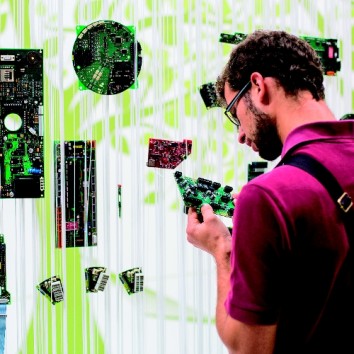
For German fair organisers research is more than just a one-off ah factor. “We want people to broaden their horizons,” explains the private fair organiser Paul Eberhard Schall. “Close cooperations with research organisations and institutes are a major conceptual element of technology shows.” The participation of academia, technical universities and institutions gives industry access to research projects and scientific findings. “In this manner we contribute to a faster, targeted implementation of scientific findings in marketable products,” confirms Schall.
The trade fair company P.E.
Schall integrates scientific partners in special shows, technology parks, exhibition
spaces, lecture series and forums. “Technology-based industries and hence the
suppliers of capital goods have a high affinity for research,” says Paul
Schall. “In addition, we frequently work with ministries and EU organisations.”
This happens, among other things, when industry-related research projects are
to be introduced and propagated. Another purpose is to provide assistance with
the fulfilment of national and international regulations – for example in the
fields of resource and energy efficiency, workplace safety and environmental
protection (www.schall-messen.de).
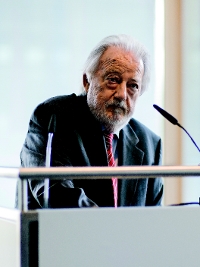
high affinity for research,” confirms Paul Schall. (Photo: Schall)
Research is deemed essential for Munich as a trade fair destination. “Above all, because our fairs have a strong focus on future-forward themes,” says Klaus Dittrich. “Research projects are an important addition to the exhibiting companies,” claims the CEO of Messe München. “This shifts the focus away from commercial aspects to technologies of the future.” Research institutions like Fraunhofer Institute take part in many trade fairs in Munich. The more technology-focused the event, the more it will be driven by research.
But be it technology, capital or consumer goods fairs – all leading events of Messe München work with research organisations. The recent edition of Bau 2015 was a case in point. 17 research institutes of the Fraunhofer Building Innovation Alliance took part in the world’s most important show for architecture, materials and systems. The participation of the Fraunhofer Building Innovation Alliance was part of the “Intelligent Urbanization“ initiative of Messe München. Its goal is to network a wide range of interest groups in order to address urbanisation as a new megatrend together (www.messe-muenchen.de).
Messe Düsseldorf sees the main reason for the cooperation with research in offering its customers attractive high-quality events. “But of course, we must definitely mention the interesting tie-in programmes designed by eminent scientific organisations,” Werner Matthias Dornscheidt, CEO of Messe Düsseldorf, points out a side benefit. “Our fairs should always give the visitor a glimpse of an industry’s future,” he underlines. This is particularly obvious in the Energy Storage congress and fair. “Due to the close connection between the conference and exhibition, attendees get up to date on the latest research,” says Dornscheidt. “In addition, they can follow economic and political debates concerning the energy storage market on all levels.“
In contrast, at most consumer goods fairs in Düsseldorf research is only indirectly in the spotlight – e.g. when the featured products incorporate the latest scientific findings. Of course, some exhibitors may showcase research that has spawned product development in their exhibits. “Say, when new medical aids are presented at Rehacare,” says Werner Matthias Dornscheidt (www.messe-duesseldorf.de).
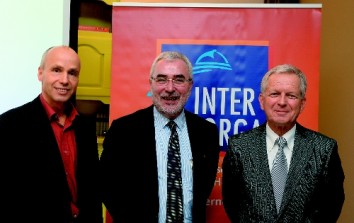
Aufderheide, Wolfgang Irrgang. (Photo: HMC / Hartmut Zielke)
Leipziger Messe believes a cooperation between research and capital goods industries can benefit both sides. “Universities and institutes may try to raise funds for their projects among companies,” says Martin Buhl-Wagner. “Or they want to find industry partners to implement their developments,” explains the Managing Director of Leipziger Messe. “For industry these cooperations not only provide access to important know-how, but also lower their own R&D costs.“ This benefits trade fairs. After all, they are an ideal platform for research institutions to show their expertise and find industry partners. “And the industry gets an idea of how technologies and materials will evolve in future,” adds Buhl-Wagner.
OT World – the international trade show and world congress for orthopaedic and rehabilitation technology – features a separate area for research & development. There universities, research institutions, companies and service providers can target an expert audience with their latest projects. The Leipzig Veterinarian Congress is a good example of this type of cooperation. It is co-organised by the Department of Veterinary Medicine of Leipzig University, a major research institution. “Together with industry partners and exhibitors, it develops new veterinary products and conducts studies to prepare them for approval procedures,” explains Martin-Buhl-Wagner. “The findings are discussed at the congress.” (www.leipziger-messe.de).
For Hamburg Messe research also means market research. Hence, it launched a project in this field at Internorga many years ago: “Investments and Trends in Communal Feeding”. For this purpose scientist Wolfgang Irrgang conducted the survey GV Barometer, which is one of the most important trend surveys on communal feeding today. “The trade and business press devote lots of column inches to the findings every year,” says Karsten Broockmann enthusiastically. “Overall, by incorporating research in trade fairs, organisers can present themselves as innovative partners of the industry,” says the spokesman of Hamburg Messe. This can also be done with awards.
The Hamburgers also believe that capital goods
fairs are “definitely more suitable” for featuring scientific research, as they
already have the right target group. “Research institutes find an interested
audience at capital goods fairs and a good environment for research marketing and
commissioned research,” explains Karsten Brookmann. “There are virtually no
scatter losses” (www.hamburg-messe.de).
Rapid.Tech in Erfurt more visionary
As a meeting place
for the world of additive manufacturing and 3D printing, Rapid.Tech has played
a major international role for over a decade. The 2015 edition from 10 to 11
June in Erfurt will have a new optimised conference structure. New topics,
visionary outlooks and insights, plus even more information are to make the
conference and trade fair even more attractive to visitors and exhibitors. “Among
other things, there will be a purely scientific section for the very first
time,” says Wieland Kniffka, Managing
Director of Messe Erfurt. A two-day conference will round off the congress
programme, with a focus on topics such as materials and quality assurance. The
forward-thinking “Vision 3D” forum will also make its debut at the next edition
of Rapid.Tech. It will not only cover future concepts but also present
promising applications and visionary approaches for additive manufacturing with
hands-on examples. There is hardly any other technology that has seen such a
dynamic development as additive manufacturing and 3D printing, points out Messe
Erfurt. And there is probably no industry that cannot benefit from these
methods to lower costs and boost productivity. (www.messe-erfurt.de).
Author: Peter Borstel
This article was published in TFI issue 1/2015
Share in Facebook, Twitter or Google+:
TFI - Trade Fairs International - The International Trade Fair Magazine.
© 2006 - 2024 by TFI-Verlagsgesellschaft mbH. All rights reserved. TFI-Verlagsgesellschaft mbH shall accept no responsibility for the contents of external links and other contents.
TFI-Know-how
-
What to do when things go wrong at virtual or in-person events?
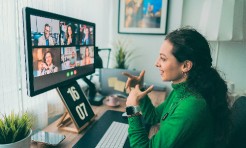
In the event world, it’s simply part of life if things don’t work out as planned.
-
How can networking be made to work at online events?

Networking typically happens at real, in-person events. But it’s also possible to do it online; it just works a little differently. There are various options available to organisers.
-
How can exhibitors stand out at trade fairs?
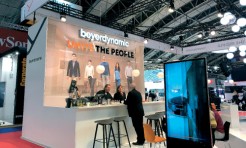
New products and a well-conceived stand design are not the only drivers for a successful presence. Many other factors are also important, but trade fair planners often lose sight of them.
-
How can industry decision-makers be reached online?
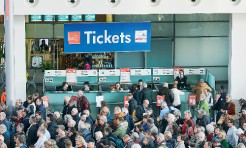
Trade fairs and trade fair companies need to constantly further develop, become more agile and flexible and offer services all year round. New, digital offerings are very important here. With its TrustedTargeting technology, Messe München offers its customers access to leading business-to-business decision-makers on the Internet.


